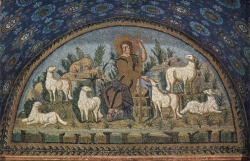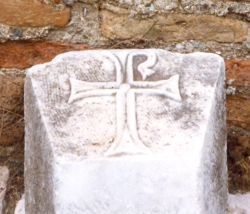Shepherd's Cross

The Shepherd's Cross is a not-so-common stylised cross which some may confuse with the more commonly seen Chi-Rho Cross. It is also important to distinguish between a Shepherd's Cross and a bishop's crozier, which is simply a symbol of prelatic authority and jurisdiction. (See also Bishop's Cross.)
In addition to the famous Psalm 23 the Shepherd's Cross is a useful reminder for those times when we feel lost, empty and don't know what to do. We can imagine Jesus as a Shepherd, guiding us and looking after us.
But the symbolism runs deeper than that:
The Good Shepherd

The Good Shepherd – 5th century mosaic in Ravenna, Italy
The Shepherd's Cross links to the parable of the Good Shepherd in John 10:11-18. The story starts by telling us of the sheep farmer who hired a day labourer to look after the flock. When a wolf came, the hired hand fled to save himself, since his life was worth more to him than a few smelly sheep.
The wolf, of course, was rather attracted to the smell of sheep. The parable then goes on to portray Jesus as the good shepherd, who doesn't flee when the wolf comes. Instead, Jesus lays down his life for the sheep to protect them from the wolf.
In this story, we are the sheep and the Devil is the wolf. However, this doesn't mean we should behave like mindless, docile lambs. Just as God doesn't walk around with a shepherd's crook, and the Devil is considerably more fearful than a wolf, the parable is to be read metaphorically.

Shepherd's Cross on marble at St. John's Church ruins near the "house of the Virgin Mary" on Bülbül Mountain, Turkiye
The cross, of course, symbolises that Jesus did indeed die for us, his flock.
(See the similar Patriarchal Cross and also the Meaning of the Cross.)
Lacrosse
A quick google of images for lacrosse sport clubs will yield an imaginative array of logos, many of which feature horned demons; presumable reflecting the aggressive spirit of the warriors who play the sport.
Indeed, lacrosse is reputedly from an Indian tribal "game", where teams of hundreds, if not thousands, would battle each other in honour of God.
The passions aroused when playing this game prompted a French Jesuit missionary, Jean de Brébeuf, to introduce the sport to Europeans. This spiritual connection may have influenced him to name the game's apparatus as a crosse, given its similarity with a bishop's crozier.
Newsday's Tom Rock quotes Powless, an Onondaga Chief:
"When we play a game here on Mother Earth, a game is taking place up there in the Land of the Creator at the same time, So then after we pass away and we are through we have a means by which we can get our stick up into the Creator's world so that we'll play again."
Our time on Earth, whether we play lacrosse or not, is a preparation for the afterlife. It's more than a game.
See, for example, the children's Saint Petersburgh teams named "Devils" and "Dragons", rather than "Saints" /www.hometeamsonline.com/...
"More Than a Game", by Tom Rock, Lacrosse Magazine, November/December 2002

